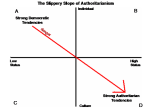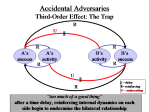Learning the right cognitive processes for thinking about the complex global political world that is emerging, for peering through the mist of time and seeing beneath the waves of current events to the currents hidden beneath…

 On 9/11, the world changed, if not because of the event, then certainly because of the reaction. How various actors reacted, how they perceive the new age, and the implications of their behavior are complicated questions. The facts and their interpretation are endlessly and usually superficially debated because most of us think we are smart enough to figure out the world by ourselves. When data are available and the problem is linear, perhaps we are, and sometimes perhaps we can even do it in our heads. But what about analyzing nonlinear, complex problems–as almost everything in human affairs is? And what about analyzing where we are headed…analyzing the future?
On 9/11, the world changed, if not because of the event, then certainly because of the reaction. How various actors reacted, how they perceive the new age, and the implications of their behavior are complicated questions. The facts and their interpretation are endlessly and usually superficially debated because most of us think we are smart enough to figure out the world by ourselves. When data are available and the problem is linear, perhaps we are, and sometimes perhaps we can even do it in our heads. But what about analyzing nonlinear, complex problems–as almost everything in human affairs is? And what about analyzing where we are headed…analyzing the future?
Without data or reliable trend lines, the analytical problem becomes overwhelming, far beyond the capacity of any human to solve without rigorous methods. This site offers an overview of such methods, methods to get behind the headlines and understand our astonishingly unexpected new post-9/11 world…how we got here and where we are headed.
That is a tough challenge, but learning a new, nonlinear perspective for thinking about such problems is easier than you might imagine and, without math or even paper, can give you a rewarding and more profound insight into how our world works. The challenge is to gain insights, rather than to “find a solution.” The key to making progress thus lies not in solving an equation but in asking penetrating questions. Put in practical terms, foreign policy fails more because it is based on false assumptions than because the decision-maker lacks data. Such frequently invalid assumptions include the assumption that reactions to actions occur in immediately or at least quickly rather than with a potentially very long delay, the recognition of a dominant dynamic but the fatal overlooking of the fact that a subordinate dynamic has exponentially increasing intensity, and the failure to account for the impact of one’s international behavior not just on one’s adversaries but on the nature of one’s own domestic society and culture.
Feel free to browse or try applying these methods to your own analytical problem. Some of the methods reviewed here can become extremely challenging. MIT offers a PhD in system dynamics, and complexity remains a wide-open research area, but the objective here is much more basic: to train yourself intuitively to ask what is perhaps, if you are the product of linear public education, a set of new questions to probe the unknown:
- “For whatever future you may imagine, what are the underlying dynamics that would generate it?”
- “Where might lie a hidden tipping point?”
- “What sort of counter-intuitive behavior at the group level might emerge from behavior at the individual level?
Succeeding pages in this section will present individual methods for clarifying thinking about the emerging world of international affairs.
_______________
NOTES:
- This site is devoted to methods, not substance.
- For discussions of the global political system, see my world affairs site, Shadowed Forest of World Politics.
- Formal contributions on methods for analyzing the future of the global political system and informal comments are both welcome. Accounts of the experience of those trying to apply these methods to real-world problems would be particularly welcome. Please go to Home to contribute.